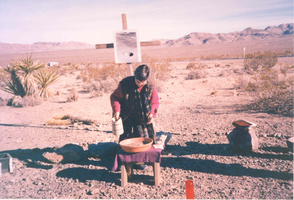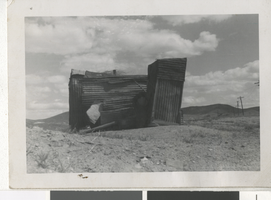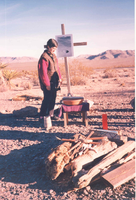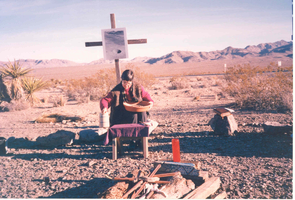Search the Special Collections and Archives Portal
Search Results
George A. Deverell oral history interview
Identifier
Abstract
Oral history interview with George A. Deverell conducted by Sharon M. Smith on April 26, 1985 for the Ralph Roske Oral History Project on Early Las Vegas. Deverell discusses working in the gaming industry, general Nevada history, World War II, and being raised under the Mormon religion.
Archival Collection
Robert Kneoki oral history interview
Identifier
Abstract
Oral history interview with Robert Kneoki conducted by Dave Harelik on March 14, 1981 for the Ralph Roske Oral History Project on Early Las Vegas. Kneoki discusses growth, crime, and religion in Nevada. He also talks about the silver mines, MX missiles, and transient people.
Archival Collection
Rev. Dr. Maureen Mackey oral history interview
Identifier
Abstract
Oral history interview with Maureen Mackey conducted by Dennis McBride on January 10, 1998 for the Las Vegas Gay Archives Oral History Project. Mackey discusses stories about her life and spiritual journey as a lesbian reverend and reveals her experiences of discriminatory treatment of gay people by traditional religion.
Archival Collection

Protestor preparing ash mixture for Ash Wednesday: photographic print
Date
Archival Collection
Description
Image

Photograph of John Bush's house, Goldfield (Nev.), 1920-1954
Date
Archival Collection
Description
Image
Berkeley Bunker oral history interview
Identifier
Abstract
Oral history interview with Berkeley Bunker conducted by Vickie Whitehead on October 13, 1972 for the Ralph Roske Oral History Project on Early Las Vegas. Bunker discusses religion, education, work, family life, politics, and economic changes in early Las Vegas, Nevada.
Archival Collection

Transcript of interview Skip Allen by Henry Pierzchala, February 27, 1980
Date
Archival Collection
Description
Text

Protestor leading the Ash Wednesday celebration: photographic print
Date
Archival Collection
Description
Image

Transcript of interview with Jacob D. Bingham by Stefani Evans and Claytee D. White, January 11, 2017
Date
Archival Collection
Description
Text

Unidentified protestor preparing the ash mixture for Ash Wednesday: photographic print
Date
Archival Collection
Description
Image
